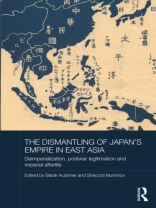The end of Japan’s empire appeared to happen very suddenly and cleanly – but, as this book shows, it was in fact very messy, with a long period of establishing or re-establishing the postwar order. Moreover, as the authors argue, empires have afterlives, which, in the case of Japan’s empire, is not much studied. This book considers the details of deimperialization, including the repatriation of Japanese personnel, the redrawing of boundaries, issues to do with prisoners of war and war criminals and new arrangements for democratic political institutions, for media and for the regulation of trade. It also discusses the continuing impact of empire on the countries ruled or occupied by Japan, where, as a result of Japanese management and administration, both formal and informal, patterns of behavior and attitudes were established that continued subsequently. This was true in Japan itself, where returning imperial personnel had to be absorbed and adjustments made to imperial thinking, and in present-day East Asia, where the shadow of Japan’s empire still lingers. This legacy of unresolved issues concerning the correct relationship of Japan, an important, energetic, outgoing nation and a potential regional "hub, " with the rest of the region not comfortably settled in this era, remains a fulcrum of regional dispute.
Barak Kushner & Sherzod Muminov
Dismantling of Japan’s Empire in East Asia [EPUB ebook]
Deimperialization, Postwar Legitimation and Imperial Afterlife
Dismantling of Japan’s Empire in East Asia [EPUB ebook]
Deimperialization, Postwar Legitimation and Imperial Afterlife
Mua cuốn sách điện tử này và nhận thêm 1 cuốn MIỄN PHÍ!
Ngôn ngữ Anh ● định dạng EPUB ● Trang 348 ● ISBN 9781317284796 ● Biên tập viên Barak Kushner & Sherzod Muminov ● Nhà xuất bản Taylor and Francis ● Được phát hành 2016 ● Có thể tải xuống 3 lần ● Tiền tệ EUR ● TÔI 5025142 ● Sao chép bảo vệ Adobe DRM
Yêu cầu trình đọc ebook có khả năng DRM












